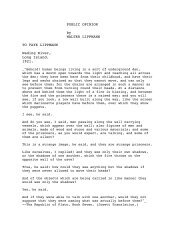Tacit Knowing: Its Bearing on Some Problems of Philosophy
Tacit Knowing: Its Bearing on Some Problems of Philosophy
Tacit Knowing: Its Bearing on Some Problems of Philosophy
You also want an ePaper? Increase the reach of your titles
YUMPU automatically turns print PDFs into web optimized ePapers that Google loves.
Michael Polanyi http://faculty.uml.edu/rinnis/45.301%20Ways%20<strong>of</strong>%20Knowi...<br />
teach us to identify some <strong>of</strong> the elementary acts c<strong>on</strong>stituting a<br />
skill, and this may be useful in training. But, while attending to<br />
the elements <strong>of</strong> a skill in themselves, we impair their smooth<br />
integrati<strong>on</strong> to the joint performance that it is their functi<strong>on</strong> to<br />
serve. If we succeeded in focusing our attenti<strong>on</strong> completely <strong>on</strong><br />
the elements <strong>of</strong> a skill, its performance would be paralyzed<br />
altogether.<br />
The mutual exclusiveness <strong>of</strong> the two kinds <strong>of</strong> knowing<br />
can be expressed in terms <strong>of</strong> a logical disjuncti<strong>on</strong>. When we<br />
know something by relying <strong>on</strong> our awareness <strong>of</strong> it for the purpose<br />
<strong>of</strong> attending to something else (i.e., we know a particular for the<br />
purpose <strong>of</strong> attending to a comprehensive entity to which it<br />
c<strong>on</strong>tributes), we cannot at the same time not rely <strong>on</strong> it for this<br />
purpose - as would necessarily be the case if we attended to it<br />
exclusively in itself.<br />
We may call “knowing by attending to” a focal knowing,<br />
and “knowing by relying <strong>on</strong>” a subsidiary knowing, and<br />
reformulate in these terms the c<strong>on</strong>clusi<strong>on</strong>s we have arrived at as<br />
follows. We know subsidiarily the particulars <strong>of</strong> a comprehensive<br />
whole when attending focally to the whole which they c<strong>on</strong>stitute;<br />
we know such particulars not in themselves but in terms <strong>of</strong> their<br />
c<strong>on</strong>tributi<strong>on</strong> to the whole. To the extent to which things are<br />
known subsidiarily in terms <strong>of</strong> something else, they cannot be<br />
known at the same time in themselves.<br />
We may call the bearing which a particular has <strong>on</strong> the<br />
comprehensive entity to which it c<strong>on</strong>tributes its meaning, and can<br />
then say that when we focus our attenti<strong>on</strong> wholly <strong>on</strong> a particular,<br />
we destroy its meaning. My introductory statement, that there are<br />
things that we know but cannot tell, can then be developed as<br />
follows. We can tell what the things are which we know by<br />
attending to them focally, but we are uncertain, or entirely<br />
ignorant, <strong>of</strong> things that we know <strong>on</strong>ly by relying <strong>on</strong> our awareness<br />
<strong>of</strong> them for attending to something else, which is their meaning.<br />
601<br />
What is subsidiarily known is tacitly known; but it seems<br />
appropriate to extend the meaning <strong>of</strong> “tacit knowing” to include<br />
the integrati<strong>on</strong> <strong>of</strong> subsidiary to focal knowing. The structure <strong>of</strong><br />
tacit knowing is then the structure <strong>of</strong> this integrative process, and<br />
knowing is tacit to the extent to which it has such a structure. So<br />
if (as it will appear) all knowing ultimately relies <strong>on</strong> a tacit<br />
process <strong>of</strong> knowing, we shall say that, ultimately, all knowledge<br />
has the structure <strong>of</strong> tacit knowledge.<br />
<str<strong>on</strong>g>Tacit</str<strong>on</strong>g> knowing cannot be strictly opposed to focal<br />
knowing because the process <strong>of</strong> tacit knowing includes our<br />
knowing <strong>of</strong> the subsidiary particulars in terms <strong>of</strong> the entity to<br />
which they c<strong>on</strong>tribute and to which we are focally attending. But<br />
the tacit character <strong>of</strong> knowing can be reduced by switching our<br />
attenti<strong>on</strong> to the particulars. We replace then, to this extent, tacit<br />
knowing by explicit inference, and in this sense tacit knowing can<br />
be opposed to (focally known) explicit inferences.<br />
Four points must yet be clarified.<br />
2 <strong>of</strong> 27 1/26/10 9:36 AM





